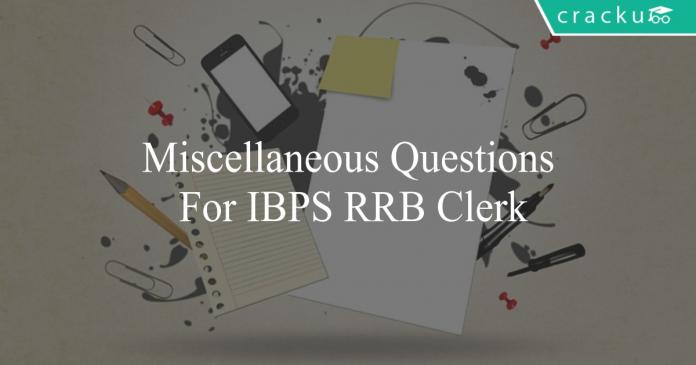Miscellaneous Questions For IBPS RRB Clerk
Download Top-20 IBPS RRB Clerk Miscellaneous Questions PDF. Miscellaneous questions based on asked questions in previous year exam papers very important for the IBPS RRB Assistant exam
Download Miscellaneous Questions For IBPS RRB Clerk
35 IBPS RRB Clerk Mocks @ Rs. 149
70 IBPS RRB (PO + Clerk) Mocks @ Rs. 199
Take a free mock test for IBPS RRB Clerk
Download IBPS RRB Clerk Previous Papers PDF
Question 1: There are four members in a family. The ratio of ages of P and R is 5 : 4. The age of Q is 7 less than double the age of P. the age of S is 2 more than double the age of R. The average age of P and Q is same as the average age of R and S. Find the age of S.
a) 24 years
b) 12 years
c) 23 years
d) 26 years
e) Can’t be determined
Question 2: A family consists of four members. The ratio of ages of wife and husband is 2 : 3. The age of Grand father is 150% of the sum of ages of mother and son. The son’s age is one less than 33.33% of the age of father. If the sum of ages of all the family members is 134. Then, find the age of son.
a) 14 years
b) 10 years
c) 12 years
d) 16 years
e) Can’t be determined
Question 3: There are three persons P, Q and R with different ages. If 10 is added to half the age of P and half the age of Q, then the resultant will be equal to Q’s age. If 9 is added to $\dfrac{1}{4}th$ of Q’s age and half of R’s age, then the resultant will be equal to P’s age. If 1 is added to half of P’s age and $\dfrac{1}{8}th$ of Q’s age, then the resultant will be equal to R’s age. Then find the age of Q.
a) 32 years
b) 18 years
c) 26 years
d) 24 years
e) Can’t be determined
Question 4: There are three persons A, B and C with different ages. If the age of A is added to half the age of B and twice the age of C, then the result is 105. If the age of B is added to twice the age of A and half the age of C, then the result is 84. If the age of C is added to half the age of A and twice the age of C, then the result is 84. Find the age of C.
a) 36 years
b) 24 years
c) 18 years
d) 12 years
e) Can’t be determined
Question 5: The sum of ages of father and his daughter is 45 years. If the product of their ages 8 years ago was 3 times the age of the father at that time. What will be the age of father after 4 years?
a) 27 years
b) 38 years
c) 11 years
d) 34 years
e) 31 years
Question 6: Find the approximate value of $\Large\frac{169.87^{2}-13.94^{2}}{183.87}$ $\large+$ $\Large\frac{3211.96}{44.002}$
a) 224
b) 236
c) 239
d) 229
e) None of these
Question 7: Find the approximate value of $17.33+142.895-76.795+235.008-4.779+38.102$
a) 321
b) 351
c) 281
d) 371
e) None of these
Question 8: Find the approximate value of ‘x’ in $\Large\frac{383.96}{x} = \frac{x}{24.01}$
a) 84
b) 96
c) 92
d) 88
e) None of these
Question 9: There are 20 compartments in a train. If each compartment can contain upto maximum of 30 people and each compartment should have different number of people except 2 compartments and no compartment should have less than 12 people in it. If the maximum number of passengers are to be filled in the train then what is the average number of people in each compartment ?
a) 21.45
b) 21
c) 20
d) 20.45
e) 22.45
Question 10: Average runs scored by Sehwag in his first 85 innings was 52 and in each of the next 5 innings till 100 innings his average gradually increased as 53 and then to 54 and then to 55 at the end of 100 innings. What is the difference between the runs scored by him in 86 to 90 innings and the last 10 innings ?
a) 340
b) 350
c) 360
d) 370
e) 380
Free Mock Test for IBPS RRB Clerk
IBPS RRB Clerk Previous Papers
Question 11: Average of four numbers is 147. First number is (5/17) times the second number and the second number is 36 less than the third number and the third number is 52 more than the half of the fourth number. What is the LCM of four numbers ?
a) 175480
b) 175000
c) 174480
d) 175420
e) 175440
Question 12: There are 4 people in a family whose ages are P,P+12,P+36 and P+60 years and after ‘y’ years the oldest of the family leaves the family and the family has only 3 people but the average of the family doesn’t change. After another ‘y’ years the average of the age of 3 people is 47 years then what is the value of P ?
a) 9
b) 10
c) 11
d) 12
e) 13
Instructions
Select the correct option.
Question 13: Quantity 1:A number is increased by 85% and then it is decreased by 15% and result is approximately 357
Quantity 2:A number is increased by 82% and then it is decreased by 12% and the result is approximately 355.5
a) Quantity 1 $\leq$Quantity 2
b) Quantity 1 $\geq$Quantity 2
c) Quantity 1 < Quantity 2
d) Quantity 1 > Quantity 2
e) Quantity 1 = Quantity 2
Question 14: Quantity 1:If the cost price of total apples bought is Rs 288 and each apple is sold at Rs 14 each and the profit percent is 50/3 then number of apples sold is
Quantity 2:An article is marked up by 40% an a discount of 30% was given then 13 times the loss percent is
a) Quantity 1 $\leq$Quantity 2
b) Quantity 1 $\geq$Quantity 2
c) Quantity 1 < Quantity 2
d) Quantity 1 > Quantity 2
e) Quantity 1 = Quantity 2
Question 15: Quantity 1:Numerator of a fraction is increased by 20% an the denominator is decreased by 25% and the resultant is 2 then the sum of numerator and denominator of the original fraction.
Quantity 2:Numerator of a fraction is increased by 50% and denominator is decreased by 60% and the resultant is 3 then the sum of numerator and denominator of original fraction is
a) Quantity 1 $\leq$Quantity 2
b) Quantity 1 $\geq$Quantity 2
c) Quantity 1 < Quantity 2
d) Quantity 1 > Quantity 2
e) Quantity 1 = Quantity 2
Instructions
Study the following table and answer the questions that follow. Some values are missing. You need to calculate them as per given information.

Question 16: If the average marks of B and D in Maths is 102.5, then find the average marks of all the students in Maths
a) 93.5
b) 87.65
c) 97
d) 102
e) Can’t be determined
Question 17: If the marks obtained by D in Physics is same as the marks obtained by D in Chemistry, then find the ratio between the marks obtained by D in Chemistry and the marks obtained by D in English.
a) 21 : 37
b) 25 : 33
c) 27 : 39
d) 23 : 33
e) None of these
Question 18: If the ratio of marks obtained by C in Physics and marks obtained by B in Physics is 10 : 11, then find the percentage of marks obtained by B in Maths if his overall percentage is 82.2%.
a) 83.33%
b) 74.85%
c) 73.33%
d) 86.5%
e) Can’t be determined
Question 19: If C obtained 81.81% in English and 74% overall, then find the difference between the marks obtained by C and A in chemistry.
a) 12
b) 10
c) 8
d) 3
e) Can’t be determined
Question 20: If the marks obtained by E in Chemistry is 25 more than that in English and if his overall percentage is 64%, then find the marks obtained by E in Chemistry.
a) 70
b) 65
c) 95
d) 84
e) Can’t be determined
Quantitative Aptitude formulas PDF
520 Banking Mocks – Just Rs. 499
Answers & Solutions:
1) Answer (D)
Let the ages of P and R be 5x and 4x years respectively.
Age of S = 2(4x)+2 = 8x+2 years
Age of Q = 2(5x)-7 = 10x-7 years
Given, $\dfrac{P+Q}{2} = \dfrac{R+S}{2}$
⇒ $P+Q = R+S$
⇒ $5x+10x-7 = 4x+8x+2$
⇒ $15x-7 = 12x+2$
⇒ $3x = 9$
⇒ $x = 3$
Therefore, Age of S = 8x+2 = 8*3+2 = 24+2 = 26 years.
2) Answer (C)
Let the ages of wife and husband be 2x and 3x years respectively.
Age of son = $\dfrac{3x}{3}-1 = x-1$ years.
Age of grandfather = 150% of 2x+x-1 = $\dfrac{3}{2}\times(3x-1) = \dfrac{9x-3}{2}$ years
Given, $2x+3x+x-1+\dfrac{9x-3}{2} = 134$
⇒ $6x+\dfrac{9x-3}{2} = 135$
=> $21x-3 = 270$
⇒ $21x = 273$
⇒ $x = 13$
Therefore, Age of Son = $x-1 = 13-1 = 12$ years
3) Answer (A)
Let the present ages of P, Q and R be P, Q and R years respectively.
$\dfrac{P}{2}+\dfrac{R}{2}+10 = Q$
⇒ $P+R+20 = 2Q$
⇒ $P-2Q+R = -20$ → (1)
$\dfrac{Q}{4}+\dfrac{R}{2}+9 = P$
⇒ $Q+2R+36 = 4P$
⇒ $4P-Q-2R = 36$ → (2)
$\dfrac{P}{2}+\dfrac{Q}{8}+1 = R$
⇒ $4P+Q+8 = 8R$
⇒ $4P+Q-8R = -8$ → (3)
Solving (1) and (2),
$6P-5Q=-4$ → (4)
Solving (2) and (3),
$-12P+5Q=-152$ → (5)
Solving (4) and (5),
Q = 32
Therefore, The present age of Q = 32 years.
4) Answer (A)
Let the ages of A, B and C be A, B and C years respectively.
$A+\dfrac{B}{2}+2C = 105$
⇒ $2A+B+4C = 210$ → (1)
$2A+B+\dfrac{C}{2} = 84$
⇒ $4A+2B+C = 168$ → (2)
$\dfrac{A}{2}+2B+C = 84$
⇒ $A+4B+2C = 168$ → (3)
Solving (1) and (3)
7B = 126 ⇒ B = 18
Substituting B value in (2) and (3)
(2) ⇒ 4A+36+C = 168
⇒ 4A+C = 132 → (4)
(3) ⇒ A+72+2C = 168
⇒ A+2C = 96 → (5)
Solving (4) and (5), we get
A = 24 and C = 36
Therefore, The present ages of A, B and C are 24 years, 18 years and 36 years respectively.
5) Answer (B)
Let the present age of father be ‘f’ and the daughter be ‘d’
As per the given question,
f + d = 45 ….(1) and
(f – 8)(d – 8) = 3(f – 8)
Substitute equation (1) in the above equation
(f – 8)(37 – f) = 3(f – 8)
37 – f = 3 (or) f = 34
The age of the father after 4 years will be 34 + 4 = 38 years.
Hence, option B is the correct answer.
6) Answer (D)
$\Large\frac{169.87^{2}-13.94^{2}}{183.87}$ $\large+$ $\Large\frac{3211.96}{44.002}\simeq \frac{170^{2}-14^{2}}{184}$ $\large+$ $\Large\frac{3212}{44}$
$= \Large\frac{(170+14)(170-14)}{184}$ $+$ $73$
$= \Large\frac{184\times156}{184}$ $+$ $73$
$= 156+73 = 229$
7) Answer (B)
$17.33+142.895-76.795+235.008-4.779+38.102 \simeq 17+143-77+235-5+38$
Adding all positive terms:
$17+143+235+38 = 433$
Adding all negative terms:
$77+5 = 82$
$\therefore$ $17+143-77+235-5+38 = 433-82 = 351$
8) Answer (B)
$\Large\frac{383.96}{x} = \frac{x}{24.01}$
$\Rightarrow x^{2} \simeq 384\times24 = 9216$
$\therefore$ x $= \sqrt{9216} = 96$
9) Answer (A)
It is given that in each compartment maximum of 30 people can be accommodated and only two compartments can have the same number of people and maximum number of people have to be accommodated in the train and so 30 people should be in two compartments and in the other compartments we should have 29,28,27……12
So the total number of passengers=30+30+29+….12
=30+(30(31)/2)-(11(12)/2)
=30+465-66
=399+30
=429
Total number of compartments=20
Average=429/20
=21.45
10) Answer (E)
Given average for first 85 innings is 52
Sum of the runs scored by Sehwag for first 85 innings=85*52
=4420
Sum of the runs scored by him in first 90 innings =90*53
=4770
Runs scored by him from 86 to 90 innings=4770-4420
=350
Runs scored by him in first 100 innings=100*55
=5500
Runs scored by him in last 10 innings=5500-4770
=730
Required difference=730-350
=380
11) Answer (E)
let the four numbers be a,b,c and d
Given a+b+c+d=147*4
a+b+c+d=588
a=5b/17
b=c-36
c=b+36
c=(d/2)+52
b+36=(d+104)/2
2b+72=d+104
d=2b-32
(5b/17)+b+b+36+2b-32=588
(5b/17)+4b+4=588
((5b+68b)/17) =584
73b=584*17
b=136
a=40
c=172
d=240
LCM of 40,136,172,240 is 175440
12) Answer (A)
Present average=(P+P+12+P+36+P+60)/4
=(4P+108)/4
After ‘y’ years P+60 age person will leave so now average becomes
((P+y+P+12+y+P+36+y)/3)=(4P+108)/4
(3P+3y+48)/3 =P+27
P+y+16=P+27
y=27-16
y=11
Now (3P+6y+48)/3 =47
3P+6y+48=141
3P=141-48-66
3P=27
P=9
13) Answer (D)
In Q1 we have x*1.85*0.85=357
x=357/(1.85*0.85)
x=227
In Q2 we have x*1.82*0.88=355.5
x=355.5/(1.82*0.88)
x=220
Therefore Q1>Q2
14) Answer (C)
In Q1 we have Total CP=288
Let the number of apples be x
Total SP=14x
Therefore ((14x-288)/(288))*100=50/3
14x-288=48
14x=288+48
x=336/14
x=24
In Q2 we have CP=100
MP=100*1.4=140
SP=MP-discount
SP=140-140*(30/100)
SP=98
Loss percent=((100-98)/(100))*100
=2%
13 times the loss percent=26
Therefore Q2 > Q1
15) Answer (E)
In Q1 let the fraction be be (x/y)
Then as given (1.2x)/(0.75y)=2
x/y =5/4
sum=5+4=9
In Q2 let the fraction be (x/y)
Then as given (1.5x)/(0.4y)=3
x/y =4/5
sum=4+5=9
16) Answer (C)
Given, average marks of B and D in Maths is 102.5
Then, Total marks obtained by B and D in Maths = 205.
Marks obtained by A in Maths = 46.67% of 150 = $\dfrac{7}{15}\times150 = 70$
Marks obtained by C in Maths = 66.67% of 150 = $\dfrac{2}{3}\times150 = 100$
Marks obtained by E in Maths = 73.33% of 150 = $\dfrac{11}{15}\times150 = 110$
Therefore, Required average = $\dfrac{70+100+110+205}{5} = \dfrac{485}{5} = 97$
17) Answer (B)
Marks obtained by D in Chemistry = Marks obtained by D in Physics = 62.5% of 120 = $\dfrac{5}{8}\times120 = 75$
Marks obtained by D in English = 90% of 110 = 99
Therefore, Required ratio = 75 : 99 = 25 : 33.
18) Answer (A)
Marks obtained by C in Physics = 83.33% of 120 = $\dfrac{5}{6}\times120 = 100$
Then, Marks obtained by B in Physics = 110 ( C’s Physics marks : B’s Physics marks = 10 : 11)
Marks obtained by B in Chemistry = 73.33% of 120 = $\dfrac{11}{15}\times120 = 88$
Marks obtained by B in English = 80% of 110 = 88
Overall percentage of B = 82.2%
Total marks obtained by B = 82.2% of 500 = 411
Then, Marks obtained by B in Maths = 411 – (110+88+88) = 125
Therefore, Required percentage = $\dfrac{125}{150}\times100 = \dfrac{5}{6}\times100 = 83.33$%.
19) Answer (B)
Marks obtained by C in English = 81.81% of 110 = $\dfrac{9}{11}\times110 = 90$
Marks obtained by C in Maths = 66.67% of 150 = $\dfrac{2}{3}\times150 = 100$
Marks obtained by C in Physics = 83.33% of 120 = $\dfrac{5}{6}\times120 = 100$
Total marks obtained by C = 74% of 500 = 370
Then, Marks obtained by C in Chemistry = 370 – (90+100+100) = 80
Marks obtained by A in Chemistry = 58.33% of 120 = $\dfrac{7}{12}\times120 = 70$
Therefore, Difference = 80 – 70 = 10.
20) Answer (C)
Marks obtained by E in Maths = 73.33% of 150 = $\dfrac{11}{15}\times150 = 110$
Marks obtained by E in Physics = 37.5% of 120 = $\dfrac{3}{8}\times120 = 45$
Let marks obtained by E in English = x% of 110 = 1.1x
Then, Marks obtained by E in Chemistry = 1.1x+25
Overall percentage of E = 64%
Total marks obtained by E = 64% of 500 = 320.
110+45+1.1x+1.1x+25 = 320
=> 2.2x = 140
=> x = 63.63
Then, Marks obtained by E in Chemistry = 1.1x+25 = $1.1\times63.63 + 25 = 70+25 = 95$



![SBI PO Puzzles Questions PDF [Most Important] _ Puzzles Questions](https://cracku.in/blog/wp-content/uploads/2022/10/Puzzles-Questions--218x150.png)

